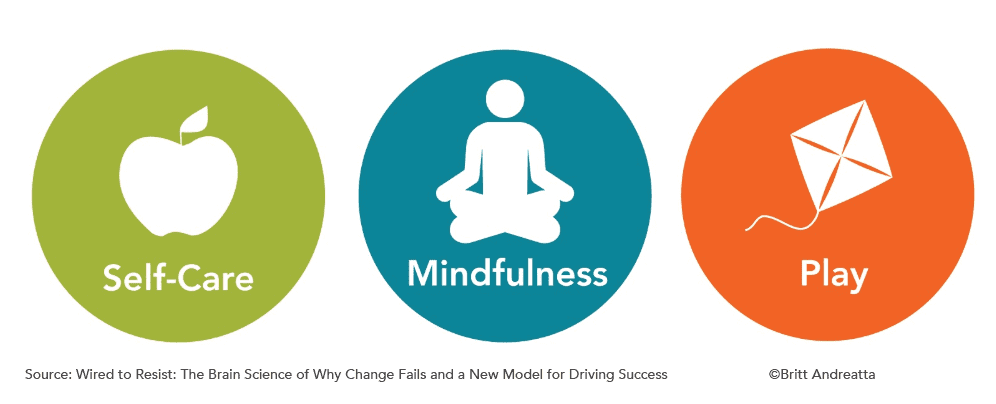Four Key Strategies of Emotionally Intelligent Leaders

To be a good leader, you have to make sound decisions, remain calm during stressful events, and be a role model for others.
And it’s hard to do any of those things if you’re not in good shape.
One of the hallmarks of Emotionally Intelligent leaders is that they invest in themselves. They engage in self-care and they seek out support because both make them more resilient and adaptive.
Self-care includes the basics you’d expect: good nutrition, sufficient sleep, and exercise. And yet, these are often the first things to go when our calendars get full and deadlines are looming. The best leaders prioritize their self-care making it non-negotiable in their schedules.

Today, many top leaders also include mindfulness practices in their daily routine. From Oprah to LinkedIn CEO Jeff Weiner, and Kobe Bryant to Arianna Huffington, leaders are discovering the powerful benefits of mindfulness.
Whether it’s meditation, yoga, or expressing gratitude, mindfulness plays a powerful role in our brains. In fact, Dr. Sara Lazar at Harvard University found that a daily mindfulness practice actually shrinks the amygdala, making it less reactive.
Dr. Richard Davidson at the University of Wisconsin uses MRIs to compare the brains of long-time meditators, like Tibetan monks, to people who have never meditated. The results are astounding. Even meditating ONE time changes the brain in a measurable way—and it’s PERMANENT.
Regular meditators are able to focus longer, less likely to worry about future events, and when something stressful does happen, they experience less distress and return quickly to their normal state. In addition, mindfulness boosts the immune system and is shown to slow aging at a cellular level. To learn more, read the book he co-wrote with Daniel Goleman, titled Altered Traits: Science Reveals How Meditation Changes Your Mind, Brain, and Body.
You should have a good play session at least once per week—and more is better. If you need more motivation, consider this quote:

Emotionally intelligent leaders also seek support from their trusted network of friends, family, and colleagues.
Whether you know it or not, your support network plays an important role in raising your EQ. Have you ever noticed that you can spend hours thinking about something and not feel better, but if you chat about it for a few minutes, the feelings shift?
Research shows that feelings need to be outwardly expressed in order to be processed and shifted. Emotions have to leave the body so talking them out works as does writing them, which is why journaling is such a powerful process.
We have to be able to express the raw, messy feelings, and not just the cleaned-up, polite versions. You may be able to do this with your social network, but I have found that most people benefit from having other avenues too. Three great options are: a structured journaling process, working with an executive coach, and/or having a personal therapist. All of these offer a truly safe space to explore and process your emotions.
Interestingly, many of these strategies are also related to positive psychology and what increases happiness. So implementing these strategies will get you a double bonus. You’ll be a better leader and you’ll be happier too!
As a leader, you also have the power to help others become more emotionally intelligent. Think about how the above strategies can be implemented in your organization. Consider how you can promote on-site coaching programs, cover counseling through insurance, offer mindfulness classes, and provide opportunities to play and laugh at work. All of them will help raise the EQ of your people, which only benefits your organization.
Study after study has shown that organizations that invest in raising emotional intelligence see huge returns on that investment.
Want to learn more? Check out my latest course, Leading with Emotional Intelligence, available on LinkedIn Learning.
Related Blogs
JOIN OUR COMMUNITY
Be the first to know of Dr. Britt Andreatta's latest news and research.





